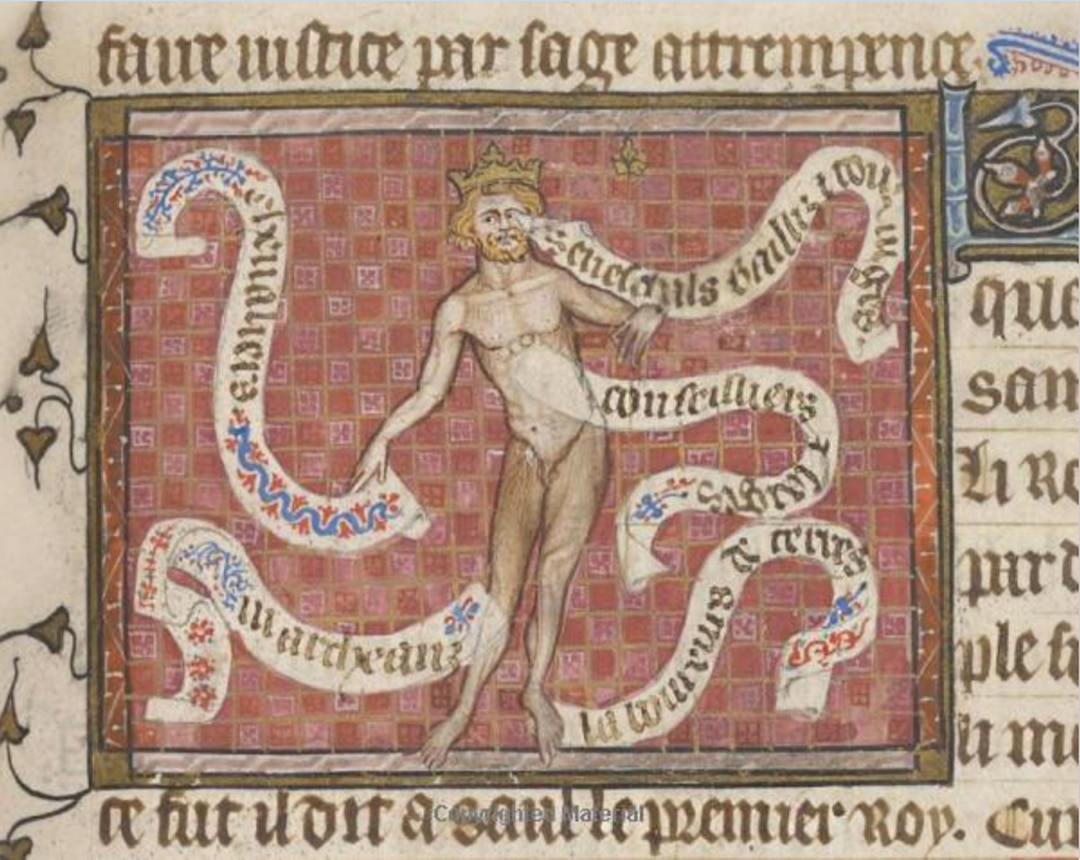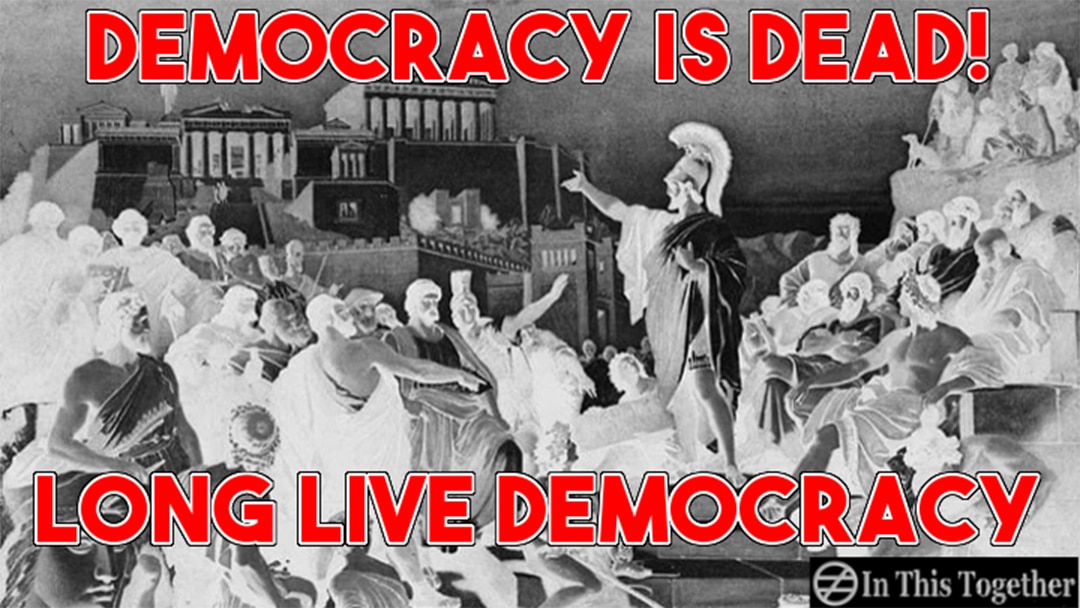
Why Democracy Leads to Tyranny
by The Academy of Ideas | Mar 30, 2024
“Remember Democracy never lasts long. It soon wastes exhausts and [destroys] itself. . .It is in vain to Say that Democracy is … less proud, less selfish, less ambitious or less avaricious than Aristocracy or Monarchy. It is not true in Fact and no where appears in history. Those Passions are the same in all Men under all forms of Simple Government, and when unchecked, produce the same Effects of Fraud Violence and Cruelty.”
Letter from John Adams to John Taylor, December 1814
In every age there is a set of beliefs that are elevated to a sacred status and questioning them is deemed heretical. For centuries it was the dogmas of Christianity that possessed this status, today it is the dogma of the democratic state. Democracy, as currently practiced, is the greatest form of government and anyone who denies this commits blasphemy – or so we are taught. But just as much of the Christian dogma was a veil to protect the power of the Church, the same can be said about democracy. Democracy, with its political campaigns, elections, and the illusion of rule by the people, is a veil behind which politicians and bureaucrats parasitically enrich themselves while imposing their corrupt vision of society on the rest of us. In this video we explore some of the fatal flaws of modern democracy and explain how instead of promoting social flourishing, it has given rise to a form of soft totalitarianism.
“Conceived as the foundation of liberty, modern democracy paves the way for tyranny. Born for the purpose of standing as a bulwark against Power, it ends by providing Power with the finest soil it has ever had in which to spread itself over the social field.”
Bertrand de Jouvenel, On Power
There are many institutions that are necessary for a free and prosperous society; these include free markets, the division of labour, a rule of law that promotes order and trust, strong families, sound money, a school system that educates instead of indoctrinates, and a robust media that pursues the truth instead of spreading propaganda. If a democracy preserves these institutions, then one can claim that it is a form of political organization conducive to social harmony. But if a democracy continually produces governments that destroy these institutions, then the value of democracy must be questioned. Across the globe, the governments of most democracies are doing the latter – from the family unit, to schooling, the media, free markets, sound money, or the rule of law, politicians and bureaucrats are actively destroying, or at least severely corrupting, these institutions. Why is this? What are the flaws of modern-day democracies that are leading it to manifest such corrupt governments?
To answer this question, we must distinguish between two types of democracy: direct democracy and indirect democracy. A direct democracy involves citizens casting votes on specific issues, usually by means of a referendum. In a direct democracy majority rules. Whether one views this form of political organization in a positive or negative light will usually depend on if one belongs to the majority or minority. Those in the majority tend to believe that direct democracy is a good system as it leads to the satisfaction of their wants, while those in the minority often feel that direct democracy is nothing more than a tyranny of the masses. “Democracy is two wolves and a lamb voting on what they are going to have for lunch,” Benjamin Franklin famously remarked. While the 19th century British politician Auberon Herbert had this to say concerning the morality of a direct democracy:
“Five men are in a room. Because three men take one view and two another, have the three men any moral right to enforce their view on the other two men? What magical power comes over the three men that because they are one more in number than the two men, therefore they suddenly become possessors of the minds and bodies of these others? As long as they were two to two, so long we supposed each man remained master of his own mind and body; but from the moment that another man, acting Heaven only knows from what motives, has joined himself to one party or the other, that party has become straightaway possessed of the souls and bodies of the other party. Was there ever such a degrading and indefensible superstition?”
Auberon Herbert, The Right and Wrong of Compulsion by the State
A tyranny of the masses, however, is not the most serious threat facing the West as we live in indirect democracies which render most people politically impotent and the power of the masses relatively negligible. In an indirect, or representational democracy, we vote for politicians who are then, in theory, supposed to represent our interests. But how representational democracy should work in theory, is not how it works in practice. In almost all democratic countries a small number of political candidates are preselected by a handful of political parties that monopolize each country’s political system and from these candidates we vote for the ones we prefer, or at least dislike the least. Once elected, far from being forced to represent the interests of the majority, politicians can, and frequently do, serve their own interests. Or as Frank Karsten and Karel Beckman note in their book Beyond Democracy:
“It is not ‘the will of the people’, but the will of politicians – prompted by groups of professional lobbyists, interest groups and activists – that reigns in a democracy.”
Frank Karsten and Karel Beckman, Beyond Democracy
Many will counter that a benefit of an indirect democracy is that we can vote out the corrupt politicians who fail to serve us. The problem, however, is that modern democracies rarely produce honest and ethical political candidates. Each time one corrupt politician is voted out of office, he or she is replaced by another corrupt politician who merely serves different special interest groups. Furthermore, nation states have grown so large that most of the state actors who rule over us and implement the policies that affect us on a day-to-day basis are bureaucrats who are not subject to popular elections.
And herein lies perhaps the most serious flaw of modern democracies – the democratic process seems incapable of preventing the worst from rising to the top in government. There are several factors that can account for this: Firstly, there is the corrupting nature of power.
“Unlimited power in the hands of limited people always leads to cruelty.”
Aleksandr Solzhenitsyn, The Gulag Archipelago
Or as Mikhail Bakunin wrote:
“However democratic may be their feelings and their intentions, once [politicians] achieve the elevation of office they can only view society in the same ways a schoolmaster views his pupils, and between pupils and masters equality cannot exist. On one side there is the feeling of a superiority that is inevitably provoked by a position of superiority; on the other side, there is a sense of inferiority which follows from the superiority of the teacher. . . Who-ever talks of political power talks of domination; but where domination exists there is inevitably a somewhat large section of society that is dominated. . .This is the eternal history of political power. . .”
Mikhail Bakunin, The Illusion of Universal Suffrage
Another factor that can account for the moral corruption of politicians is that like a moth to flame, the most ruthless and power-hungry among us are attracted to state power. Those who enter the game of politics are often the very individuals who we least want to rule over us, or as Frank Herbert wrote:
“All governments suffer a recurring problem: Power attracts pathological personalities. It is not that power corrupts but that it is magnetic to the corruptible.”
Frank Herbert, Chapterhouse: Dune
Another explanation for why the worst rise to the top in modern politics is because Machiavellian, narcissistic, and sociopathic character traits improve one’s chance of winning a political election or getting promoted to the position of a high-level bureaucrat. Or as the philosopher Hans Hermann Hoppe explains:
“. . . the selection of state rulers by means of popular elections makes it essentially impossible for harmless or decent persons to ever rise to the top. Presidents and prime ministers come into their position not owing to their status as natural aristocrats, as feudal kings once did . . .but as a result of their capacity as morally uninhibited demagogues. Hence, democracy virtually assures that only dangerous men will rise to the top of state government.”
Hans Hermann Hoppe, From Aristocracy to Monarchy to Democracy
Once in power these demagogues are effectively shielded from the wrath of the citizenry due to a mirage that is created by the dogma of democracy. Most people believe that in a democracy it is we the people that rule, and that as rulers we are collectively to blame for the corruption, ineptitude, and immorality of our government. This belief overlooks the fact that most of us have no impact on the actions of politicians and it diverts responsibility away from the politicians and bureaucrats who are responsible for the policies that are destroying society. Furthermore, when it is believed that we the people rule, our resistance toward the dangerous growth of state power is weakened, or as Hoppe explains:
“Under democracy the distinction between the rulers and the ruled becomes blurred. The illusion even arises that the distinction no longer exists: that with democratic government no one is ruled by anyone, but everyone instead rules himself. Accordingly, public resistance against government power is systematically weakened.”
Hans Hermann Hoppe, From Aristocracy to Monarchy to Democracy
This weakened resistance to the growth of state power has created a fertile ground for the emergence of totalitarian rule across the West. Many will counter that the democratic West is not at all like the totalitarian countries of the past, be it Soviet Russia, Communist China, Nazi Germany, Cuba, or North Korea. These countries centralized power and controlled the lives of their citizens to a degree never seen in history and to a level which far exceeds the experience of the modern West. But the centralization of government power in Western democracies, differs only in degree to that seen in the totalitarian countries of the 20th century. Western democracies are what can be called soft totalitarian states in contrast to the more brutal manifestations of totalitarianism past. In 1835 Alexis de Tocqueville foresaw the rise of soft totalitarianism in Western democracies and described it in his great work Democracy in America:
“After having…taken each individual one by one into its powerful hands, and having molded him as it pleases, the sovereign power extends its arms over the entire society; it covers the surface of society with a network of small, complicated, minute, and uniform rules, which the most original minds and the most vigorous souls cannot break through to go beyond the crowd; it does not break wills, but it softens them, bends them and directs them; it rarely forces action, but it constantly opposes your acting…it hinders, it represses, it enervates, it extinguishes, it stupifies, and finally it reduces each nation to being nothing more than a flock of timid and industrious animals, of which the government is the shepherd.”
Alexis de Toqueville, Democracy in America
Prior to the rise of this soft totalitarianism, social relations were dominated by a multiplicity of different institutions and associations which were independent of government – such as markets, guilds, churches, private hospitals, universities, fraternities, charities, monasteries, and most importantly the “primal community of the family”. These independent associations and institutions, while providing great societal benefits, also acted as barriers to the expansion of government power. The destruction and replacement of these more diverse forms of community with relationships between the individual and the state, which began in the West in the 20th century and continues to this day, was a crucial step in the rise of governments who hide their totalitarian nature behind the veil of the democratic ideal. Or as Robert Nisbet wrote in The Quest for Community:
“It is not the extermination of individuals that is ultimately desired by totalitarian rulers. . . What is desired is the extermination of those social relationships which, by their autonomous existence, must always constitute a barrier to the achievement of the absolute political community. The prime object of totalitarian government thus becomes the incessant destruction of all evidence of spontaneous, autonomous association…To destroy or diminish the reality of the smaller areas of society, to abolish or restrict the range of cultural alternatives offered to individuals. . . is to destroy in time the roots of the will to resist despotism in its large forms.”
Robert Nisbet, The Quest for Community
In places like Nazi Germany and Soviet Russia the destruction of institutions independent of the state was done quite rapidly and with the use of violence. The same process has been occurring in Western democracies, but at a slower pace and instead of violence, these alternative institutions are crippled with the use of propaganda, educational indoctrination, laws, regulations, and bureaucratic red tape. But no matter how totalitarianism emerges the result is always the same. Citizens becomes subjects, the state becomes the master, and even if we are still granted the right to vote, we are enslaved nonetheless, or as Lysander Spooner wrote:
“A man is none the less a slave because he is allowed to choose a new master once in a term of years.”
Lysander Spooner, The Constitution of No Authority
If our democracies cannot prevent the worst from rising to the top and if they cannot protect us from the rise of a soft totalitarianism, then democracy, as currently practiced, is a failed institutions and alternative forms of political organization must be explored and openly debated. Some may continue to hold out hope that a political saviour will emerge, overcome all the corrupting influences of the state, and return society to a path of peace and prosperity. This, however, is to gamble with the future of society. For as we wait for our saviour, who may never emerge, the state will continue to grow more and more burdensome, and then slowly at first, but ever more rapidly, our societies will deteriorate into the hellish conditions that characterize all totalitarian nations, for as James Kalb noted:
“If all social order becomes dependent on the administrative state, when that becomes terminally corrupt and non-functional everything goes.”
James Kalb, The Tyranny of Liberalism





0 Comments